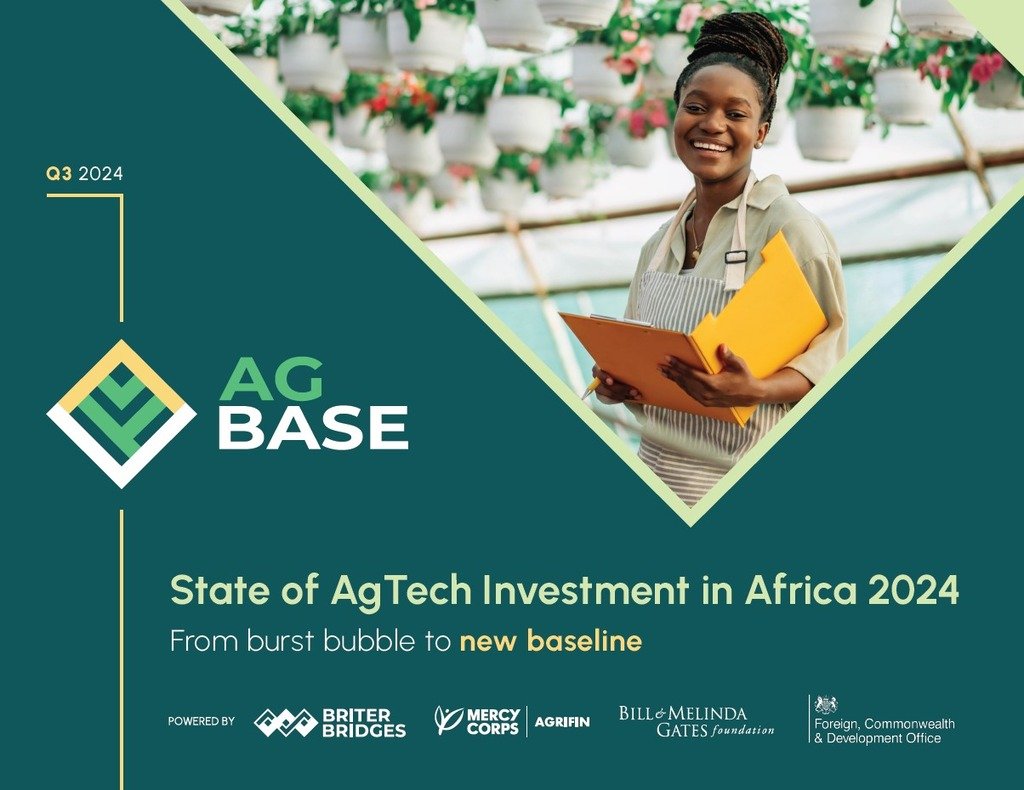As agriculture grapples with the dual challenges of increasing food demand and climate change, the role of AgTech has become central to sustainable solutions. The “State of AgTech Investment in Africa 2024” report by AgBase provides a sweeping view of the evolution of AgTech investment trends over the past decade, highlighting key insights for farmers, agropreneurs, and AgTech stakeholders worldwide.
The Evolving Landscape of AgTech Investment
From 2014 to Q3 2024, African agriculture tech companies have raised over $1.56 billion through more than 700 deals. However, the ecosystem’s trajectory has been marked by volatility, with rapid growth between 2021-2022 peaking in a bubble that burst in 2023. The current funding baseline, while lower than the peak, is 50% higher than pre-2020 levels, signaling resilience.
In the past year alone, 131 agriculture technology startups raised $215 million across 158 deals, constituting nearly 25% of all deals in Africa’s technology ecosystem. This stabilization contrasts sharply with a 50% decline in funding volumes across sectors like FinTech and E-commerce, showcasing AgTech’s durability.
Opportunities and Challenges for Agropreneurs
- Early-Stage Growth: Deals under $100,000 have grown to 59% of total investments, supported by grants, awards, and accelerators. For startups, this indicates a conducive environment for seed funding.
- Diverse Instruments: While equity dominates, new mechanisms like bonds, convertibles, and blended finance are rising, offering agripreneurs innovative options.
Funding for on-farm solutions like Agriculture Marketplaces and FinTech remains dominant, comprising 74% of total funding. However, post-farm solutions, which include food processing and logistics, saw an 80% drop in funding, while retail AgTech surged by 216%, driven by food delivery and retail tech solutions.
Also read: Rwanda launches agriculture strategy to build resilient, sustainable agrofood systems
Insights for Farmers: Technology Trends Shaping Agriculture
Climate-Smart Innovations – Agriculture technology companies offering climate-smart solutions accounted for 53% of funding over the past year. These include solar-powered irrigation, cold chain logistics, and carbon monitoring—key tools for smallholder farmers to adapt to and mitigate climate risks.
Rise of Asset-Heavy AgTechs – Funding for asset-heavy technologies such as robotics and mechanized equipment surged to 34% of total volumes. This trend signals a shift towards infrastructural advancements that promise efficiency gains in farming operations.
AI in agriculture technology –AI’s role in African AgTech is growing, with deals increasing to 15% of the total. Applications include precision agriculture and soil testing, though funding remains nascent, reflecting untapped potential.
Regional and Gender Perspectives
Geographic Highlights –Kenya’s agriculture technology ecosystem continues to lead, capturing 45% more funding than the previous year. Emerging markets like Ethiopia, Zambia, and DRC have seen significant growth, collectively accounting for 10% of investments.
Gender Inclusivity – AgTech startups with at least one woman founder secured 17% of funding, marking progress. However, all-women-founded startups lag behind, receiving only 2% of total funding, highlighting a need for equitable support structures.
Key Takeaways for AgTech Innovators
Funder Shifts – Semi-commercial funders, including DFIs and impact investors, dominate with 70% of late-stage deals involving their participation. Commercial funders have retreated by 43%, underscoring the need for innovative business models to attract traditional capital.
Emphasis on Climate Metrics – The growing focus on climate-smart agriculture necessitates standard metrics to measure impact, ensuring investments lead to tangible outcomes for ecosystems and communities.
Linking AgTech with Digitalization – Markets with high digital inclusion, such as Kenya and Nigeria, continue to attract significant funding. Investments in digital farmer registries, e-vouchers, and open data platforms could bridge gaps in underserved regions.
Shaping the Future of AgTech
The report outlines five strategic focus areas:
- Business Model Innovation: Beyond product and beneficiary data, funders seek clarity on scalable and sustainable models.
- Digital Synergies: Integrating AgTech with digital infrastructure can amplify farmer reach.
- Diverse Funding Pathways: Blended finance and local funder support are critical for ecosystem resilience.
- Corporate Collaboration: Engaging corporates outside retail can unlock B2B opportunities.
- Climate-Smart Metrics: Standardized measures for climate impact are vital to combating greenwashing and ensuring accountability.
A Pivotal Moment for African AgTech
The “State of AgTech Investment in Africa 2024” provides a clear lens into the opportunities and hurdles shaping the sector. With over $215 million invested in the past year and an increasingly diverse funding landscape, the African AgTech ecosystem is poised for transformative growth. However, success hinges on addressing key challenges such as funder engagement, gender inclusivity, and the integration of climate-smart and digital solutions.
By fostering collaboration among stakeholders—farmers, agropreneurs, and funders alike—Africa can unlock the full potential of AgTech, ensuring both economic and environmental resilience. This pivotal moment underscores the need for strategic actions that will sustain innovation while delivering real-world impact across the agro-food value chain.


